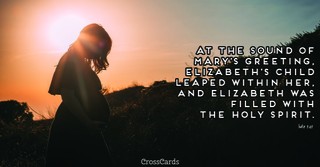
- Recent Translations
- All Translations
The Birth of John the Baptist Foretold
5 In the time of Herod king of Judea there was a priest named Zechariah, who belonged to the priestly division of Abijah; his wife Elizabeth was also a descendant of Aaron.The Birth of Jesus Foretold
26 In the sixth month of Elizabeth’s pregnancy, God sent the angel Gabriel to Nazareth, a town in Galilee,Images for Luke 1:5-35

Luke 1:5-35 Meaning and Commentary
INTRODUCTION TO LUKE
The writer of this Gospel, Luke, has been, by some, thought, as Origen {a} relates, to be the same with Lucius, mentioned in Ro 16:21, but he seems rather to be, and without doubt is, Luke the beloved physician, who was a companion of the Apostle Paul in great part of his travels in the Gentile world: he came with him to Jerusalem, and from thence accompanied him to Rome, and continued with him when in prison, and was with him to the last; see Ac 16:10,11 \Col 4:14 2Ti 4:11 Phm 1:24\. Jerom {b}, and others, say, he was a physician of Antioch in Syria; where it may be the Apostle Paul met with him, and might be the happy instrument of his conversion; so that he seems to be, by nation, a Syrian, as Jerom {c} calls him. Grotius thinks his name is Roman, and that it is the contraction of Lucilius. It is not an Hebrew name, but might be in common use in Syria; for though the Jews reckon owqwl, "Lukus", among foreign names, yet say {d} a it was a very illustrious one, and well known to them, as it may well be thought to be if Syriac, the language being spoke by them: and many Jews lived in Syria, and particularly in Antioch. Some say that this Gospel was written by the advice, and assistance, and under the direction of the Apostle Paul, as the Gospel according to Mark was by that of Peter; though the following preface does not seem so well to accord with this. Eusebius says {e} that it was the sense of the ancients, that whenever the Apostle Paul makes mention of his Gospel, he intends this according to Luke. The time of the writing of it is not certain; some say it was written in the fifteenth year after the ascension of our Lord; others in the twenty second; and others in the twenty seventh. It is commonly thought to have been written after the Gospels of Matthew and Mark, according to the order in which it stands; but this is rejected by some learned men, who rather think that Luke wrote first of all: and indeed, there are some things in his preface which look as if there had not, as yet, been any authentic account published, at least which was come to the knowledge of this evangelist. The place where he wrote it is also uncertain. Jerom says {f}, he wrote it in the parts of Achaia, perhaps at Corinth: according to the titles prefixed to the Syriac and Persic versions, he wrote it in Alexandria: the former of these runs thus;
``the Gospel of Luke, the Evangelist, which he spake and published in Greek in Alexandria the great.''
And the latter thus;
``the Gospel of Luke, which he wrote in the Greek tongue in Alexandria of Egypt.''
However, it is agreed on all hands, that it is genuine, and of divine inspiration. Eusebius {g} relates, that it was affirmed by some, that this Gospel, together with those of Matthew and Mark, were brought to the Apostle John, who approved of them, and bore witness to the truth in them.
{a} In Rom. xvi. 21. {b} Catalog. Script. Eccles. sect. 17. fol. 91. Euseb. Eccl. Hist. l. 3. c. 4. {c} Praefat in Luc. {d} T. Bab. Gittin, fol. 11. 2. & Gloss. in ib. {e} Ubi supra. (Hist. Eccl. l. 3. c. 39.) {f} Praefat in Luc. {g} Eccl. Hist. l. 3. c. 24.
Cross References 40
-
1.
Matthew 2:1 -
2.
1 Chronicles 24:10 -
3.
Genesis 6:9 ;Genesis 7:1 ;Deuteronomy 5:33 ;1 Kings 9:4 ;Luke 2:25 -
4.
1 Chronicles 24:19 ;2 Chronicles 8:14 -
5.
Acts 1:26 -
6.
Exodus 30:7,8 ;1 Chronicles 23:13 ;2 Chronicles 29:11 ;Psalms 141:2 -
7.
Leviticus 16:17 -
8.
S
Acts 5:19 -
9.
Exodus 30:1-10 -
10.
Judges 6:22,23 ;Judges 13:22 -
11.
ver 30; S
Matthew 14:27 -
12.
ver 60,63; S
Matthew 3:1 - 13. ver 58
-
14.
Numbers 6:3 ;Leviticus 10:9 ;Judges 13:4 ;Luke 7:33 -
15.
ver 41,67;
Acts 2:4 ;Acts 4:8,31 ;Acts 6:3,5 ;Acts 9:17 ;Acts 11:24 ;Ephesians 5:18 ; SActs 10:44 -
16.
Jeremiah 1:5 ;Galatians 1:15 - 17. ver 76
-
18.
S
Matthew 11:14 -
19.
Malachi 4:5,6 -
20.
S
Matthew 3:3 -
21.
Genesis 15:8 -
22.
ver 34;
Genesis 17:17 -
23.
ver 26;
Daniel 8:16 ;Daniel 9:21 ;Matthew 18:10 -
24.
Exodus 4:11 ;Ezekiel 3:26 - 25. ver 62
-
26.
Genesis 30:23 ;Isaiah 4:1 - 27. S ver 19
-
28.
S
Matthew 2:23 -
29.
Mt 1:16,18,20 ;Luke 2:4 -
30.
ver 13; S
Matthew 14:27 -
31.
Genesis 6:8 -
32.
Isaiah 7:14 ;Matthew 1:21,25 ;Luke 2:21 -
33.
ver 35,76; S
Mark 5:7 -
34.
S
Matthew 1:1 -
35.
Matthew 28:18 -
36.
2 Samuel 7:16 ;Psalms 89:3,4 ;Isaiah 9:7 ;Jeremiah 33:17 ;Daniel 2:44 ;Daniel 7:14,27 ;Micah 4:7 ;Hebrews 1:8 -
37.
Matthew 1:18 -
38.
ver 32,76; S
Mark 5:7 -
39.
S
Mark 1:24 -
40.
S
Matthew 4:3
Footnotes 1
- [a] Or "So the child to be born will be called holy,"